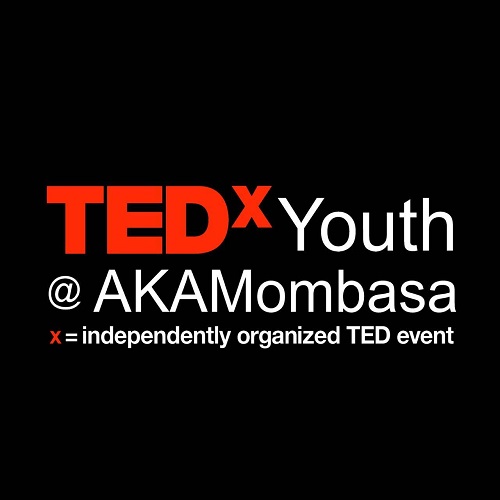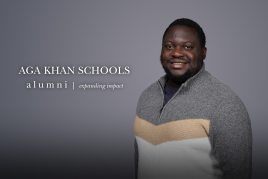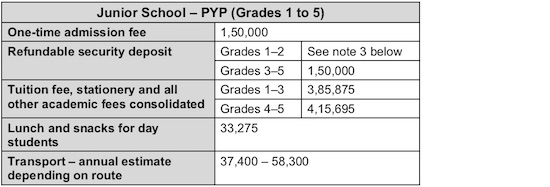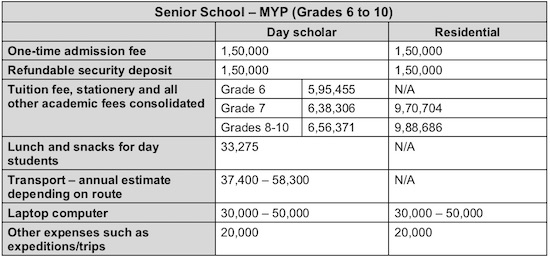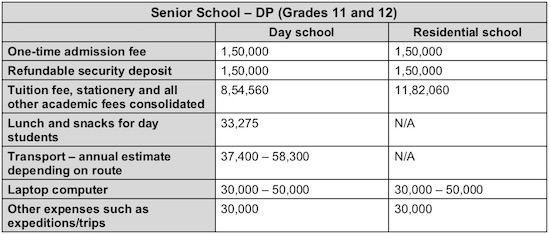“Creating leaders”: Impact of an Aga Khan Schools education
During his time at the Aga Khan Academy Mombasa, Ham Serunjogi (Class of 2012) – CEO and co-founder of African fintech giant Chipper Cash – realised the importance of staying connected to something larger than himself and giving back to the world. This fuelled his remarkable success, and recently, the Forbes 30 Under 30 honouree was selected to serve as an advisor to the US President on African diaspora engagement.
“A big part of it was that I was in the residential programme,” Ham says. “My roommates and my house parents were a central part of my experience; they practically became family to me.”Originally from Uganda, Ham became a part of the Academy’s residential programme, where students in Grades 6-12 from around the world live on campus and participate in different activities and leadership opportunities.
“The group of friends I had on the floor we lived on,” he continues, “I value those friendships deeply.”
Ham credits his dorm parent, Mr Bardai, as a large part of his amazing experience at the Academy.
“Mr Bardai was absolutely the best and looked out for me,” he said. “We remain close to this day.”
Along with his residential parents, Ham fondly recalls teachers such as Mr Kassam, who incorporated meals in his English lessons as they were described in books the students read in class, which encouraged the kids to bring in their own dishes for a potluck.
“We had a really fun time in class with Mr Kassam.”
Ham also recollects his role as President of the Academy’s Student Representative Council, which allowed him to lead the secondary school students and work closely with his peers and teachers.
“The Academies as a whole aim to instil in their education the notion of creating people who are leaders that can come back and help develop their local communities,” he explains. “The idea of being a net positive contributor to society – that was something I learnt strongly.”
“The more I think back on the ways the Academy made sure we were connected to the community, with the events we did outside of the Academy with other community members, that was a key reminder to not stay in an isolated group of privileged people or with people that aren’t connected to something larger than ourselves,” he explains.
“That really resonated with my time over there.”
From Kampala to Mombasa to Iowa
After completing the International Baccalaureate (IB) Diploma Programme at the Academy, Ham’s journey leaped to another continent when he moved to Iowa in the US to study economics at the prestigious Grinnell College.
He was ready for the adventure, thanking his move to the Academy in Mombasa from his hometown in Kampala, Uganda as an insight into what it is like to move away.
“[My time at the Academy] was the first time in my life I lived away from home,” he says. “It was like a nice trial period before moving further away.”
“I was excited to move to Grinnell, to Iowa, for all the big and small things like seeing snow for the first time,” he reflects. “Just being around a new environment, new culture and a new group of people was very exciting.”
The creation of Chipper Cash
Following his graduation from Grinnell and a two-year stint at Meta (formerly Facebook) came a pivotal stage in Ham’s life. In 2018, he and his co-founder Maijid Moujaled established Chipper Cash, a financial technology, or fintech, company offering several products and services to people in Africa, such as local and cross-border payments, cards, stocks, airtime and data, and bill pay.
“I wanted to make an impact on my local community with what I know best,” Ham says. “I wanted to create a solution that might solve a problem for people in Uganda.”
The CEO met his co-founder at Grinnell, who wanted to create a similar solution for the people of Ghana, where he was originally from.
“It was easy to align our thinking because we wanted to start the company to check some boxes – what needs to be done and where?”
Chipper Cash now has over five million customers operating in countries including Nigeria, Rwanda, Ghana, Uganda and the US. It has been featured in several global financial publications as well as news channels including BBC, CNN, Quartz, Apple and Forbes, in which Ham was named as one of the honourees of the Forbes 30 Under 30 Finance List of 2023.
Serving on the US President’s advisory council
In September 2023, Ham was appointed to serve on the Inaugural President’s Advisory Council on African Diaspora Engagement in the United States. The Advisory Council is tasked to advise the US President on a range of issues, including how to strengthen relations between Africa and the US, promote trade and investment, and build educational exchanges.
“I definitely pinch myself every night just to make sure I’m not dreaming,” he laughs. “If you’d ask me at any point in my life if I would ever be an advisor to the US President, there’s no way I’d have thought that’s possible.”
Ham highlights what he is most excited about for his role as an advisor.
“One, it’s an incredible group of people to be a part of,” he says. “And two, in today’s world, Africa is the fastest growing continent and they’re strong partners with the US. We will help advise the President to form policy and help drive US-African relations and investment further.”
“Policy is going to affect billions of people, and if we do our job well, we’ll make a positive impact on the world. If that’s all I ever do in my life, I’ll be very happy with myself.”
Giving back to the Academy
Ham feels fortunate to be in a position where he can give back to the place that started it all. The alumnus consistently provides the Academy in Mombasa with support by coming back to address graduates, creating videos and content to promote the Academy, or even donating to support current and future students.
“It’s a special place to me,” Ham describes. “I was fortunate enough to give the 2021 graduation commencement address, and the theme of my remarks was the realisation of the opportunities I’ve been lucky to receive, and the best way to repay them is to help repair the world.”
Fee schedule test
Fee schedule for the 2018-2019 academic year.
![]() Aga Khan Academy Hyderabad Fee Schedule - 2018-19.pdf
Aga Khan Academy Hyderabad Fee Schedule - 2018-19.pdf
Notes
1 A one-time non-refundable admission fee is payable for students enrolling for the first time. The admission fee must be paid to secure the place for a child at the Academy. This cannot be deferred or paid in instalments. The due date is one week after the offer has been accepted.
2 A one-time refundable security deposit is also payable on acceptance of admission and should be paid together with the admission fee mentioned above. It is refundable when a student leaves the Academy as long as the required notice has been given in writing and “No Dues” clearance is obtained from the Academy. No interest is payable on this deposit.
3 Grade 1 & 2 students will have option to pay refundable security deposit in two instalments. First instalment of Rs. 75,000 when they enter grade 3/4 and second instalment when they enter grade 5/6.
4 A sibling discount on tuition fees of 15% will be applicable for second and subsequent children.
5 Tuition fees for the academic year may be paid in full with an early-payment discount of 3% on or before 31 July. This discount is applicable on the net amount payable after other discounts have been deducted.
6 Tuition fees are payable in two equal instalments, no later than 31st July and 15th December of each academic year. For DP2 (grade 12) students the due date for the second instalment is 15th November.
7 For new admissions to an academic year the tuition fees must be paid within 30 days of admission to secure a place at the Academy.
8 The Academy will charge a monthly sur-charge of 2% on the total outstanding dues older than 30 days. In case the fees are not paid within one month’s period following the deadline, the student will not be allowed to attend classes or participate in other activities undertaken by the Academy.
9 Tuition fees include course fees, use of essential course books, library books, IT and science laboratory equipment and certain classroom supplies. The fees do not include uniform costs.
10 Exam fees for IB Middle Years Programme and the Diploma Programme will be billed separately based on the actual fee issued by the International Baccalaureate Organization (IBO).
11 Parents of returning students will be invoiced four to six weeks prior to the new academic year.
12 The Academy no longer accepts cash for fee payments. All payments must be made by direct bank deposit, bank transfer, cheque or demand draft even if the payment is being made by a third party such as a sponsoring organization. Parents must provide the finance office (finance@agakhanacademies.org), with a hard or an electronic copy of proof of payment showing the full name of the student and the student identification number within 15 days of fund transfer for issuance of payment receipt. Absence of this information may delay crediting the fees reflected on your account in our system.
13 Parents are responsible for ensuring that the fee payments are made into the correct bank account of the Academy. In the unlikely event of any change in bank account details, the changes will be communicated to parents in writing via a hand delivered letter from the Academy.
14 If a student wishes to leave the Academy, one term’s advance notice of withdrawal must be given in writing or one term’s worth of the annual fees will be due and payable. School clearance will not be possible until any outstanding dues are settled in full.
15 The Academy reserves the right to withhold results, school certificates, transcripts or any other information and/or documents until all outstanding dues are settled in full.
16 Admitted students, who demonstrate financial need and duly fill in and submit the application along with required supporting documents within the stipulated time, can be considered for financial aid. An independent financial aid committee is responsible for reviewing and approving any request for financial aid by students.
17 The above terms and conditions may be modified or new terms may apply to reflect changes in the law or our services. For further information, please contact us at admissions.hyderabad@agakhanacademies.org.
18 Please note that fee structures are subject to annual review.
AKA, Hyderabad Student Featured in IB Global News
AKA, Hyderabad student Khushboo Khoja is highlighted as the featured student in IB Global News.

Hyderabad students march for climate action - 4:30pm, Friday 24th May
Academy staff & students will join others across the world to strike for climate justice. Venue: "Love Hyderabad" between Eat Street & People's Plaza, Necklace Road, Hyderabad.
The Aga Khan Academy Hyderabad
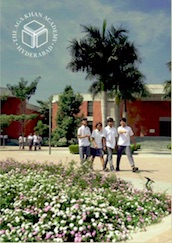
1st network exchange between Hyderabad and Mombasa Academies
Congratulations to Laboni Banerjee, S.N Prasad and Ira Shrivastav who are headed to Mombasa through the March break for professional development and learning exchange. 3 teachers from Mombasa will come to Hyderabad for 2 weeks in April.
